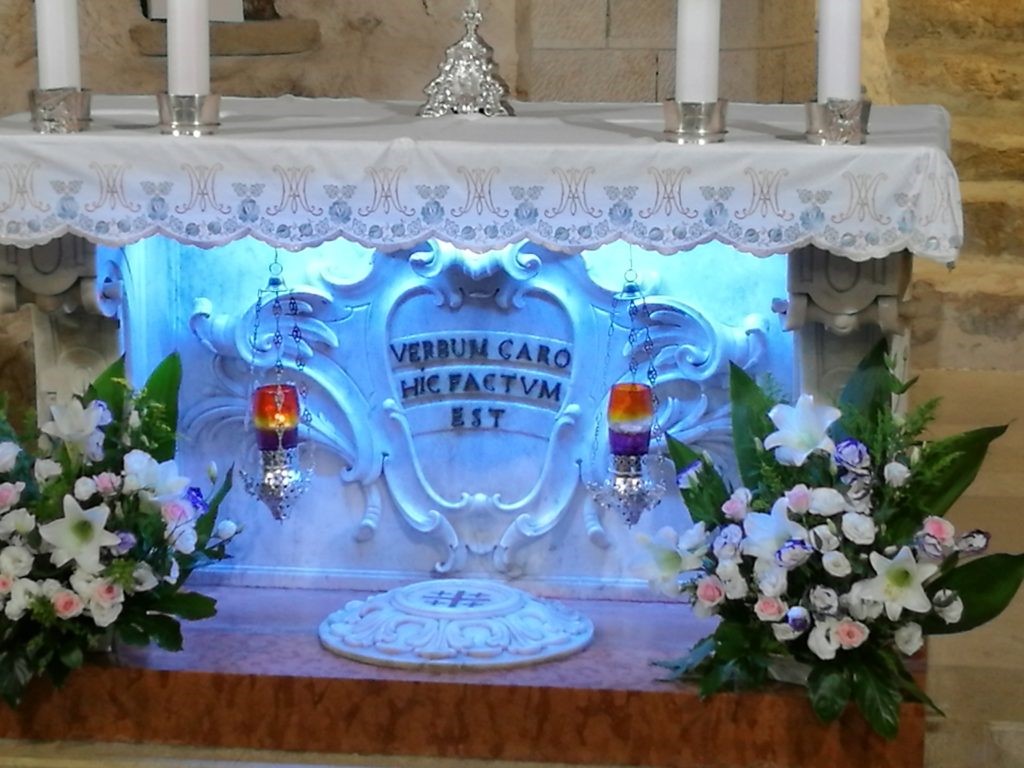“Verbum caro hic factum est” – Here, the Word was made flesh. Altar inscription in Nazareth, house of our Lady. (Photo by José Mario O. Mandía)
– Rev José Mario O. Mandía
Number 85 of the Compendium of the Catechism of the Catholic Church (CCCC) asks: Why did the Son of God Become Man? Then it gives four reasons, summarizing points 457-460 of the CCC:
“For us men and for our salvation, the Son of God became incarnate in the womb of the Virgin Mary by the power of the Holy Spirit. He did so to reconcile us sinners with God, to have us learn of God’s infinite love, to be our model of holiness and to make us ‘partakers of the divine nature’ (2 Peter 1:4).
1. Jesus is the Mediator who reconciles us with God. Our first parents, like the prodigal son in the Gospel (cf Luke 15:10-32), left the Father’s house by their own will. But God’s mercy is bigger than our pride, so He devised a plan to recover us and lead us back home. This plan requires a mediator, and there can be no better mediator than Jesus Christ Himself.
Why?
A good mediator should be able to represent both parties. Jesus is Perfect God, so He can speak and act on God’s behalf. Jesus is Perfect Man, so He can speak and act on man’s behalf. He is the perfect go-between, the ideal intermediary. “For there is one God, and there is one mediator between God and men, the man Christ Jesus, who gave himself as a ransom for all, the testimony to which was borne at the proper time” (I Timothy 2:5-6).
2. The CCC teaches that Jesus reveals God’s love for us. We can add one more thing: He is the perfect embodiment of God’s infinite justice and infinite mercy.
We have probably been puzzled by the claim that God is both infinitely just and infinitely merciful. The two attributes do not seem compatible. If one is just, he needs to punish the offender. If he is merciful, then he has to spare the offender from the punishment. The answer to this conundrum is Jesus Christ.
Why?
God is infinitely just, so he decrees that man be punished. And man is indeed punished, represented by the Perfect Man Jesus Christ. The force of Divine Justice is unleashed upon His Sacred Humanity.
God is infinitely merciful, and by punishing the Man Jesus, he spares the rest of humanity from the chastisement for its sin.
“But he was wounded for our transgressions, he was bruised for our iniquities; upon him was the chastisement that made us whole, and with his stripes we are healed. All we like sheep have gone astray; we have turned every one to his own way; and the LORD has laid on him the iniquity of us all” (Isaiah 53:5-6).
3. To be our Model of holiness. God the Father wanted us to be children again, but we needed someone who could give us a perfect example of how to behave as children. Jesus Christ became man with a body and soul like ours. His having a body made it possible for us to see and hear Him. Jesus is the visible Model of how to behave as God’s faithful children, as God’s Beloved.
“And a voice came out of the cloud, saying, ‘This is my Son, my Chosen; listen to him!’” (Luke 9:35).
4. To make us sharers in the Divine nature. Jesus shared our human nature – our body, soul, intellect, will, freedom, sentiments – and He, in turn, made us “partakers of the divine nature” (II Peter 1:4). CCC 460 teaches: “‘For the Son of God became man so that we might become God’ (St Athanasius, De incarnatione 54, 3). ‘The only-begotten Son of God, wanting to make us sharers in his divinity, assumed our nature, so that he, made man, might make men gods’ (St Thomas Aquinas, Opusc. 57, 1-4).”
Through the sacraments of Baptism and Penance, Jesus Christ gives us back the privileges that our first parents refused.


 Follow
Follow


